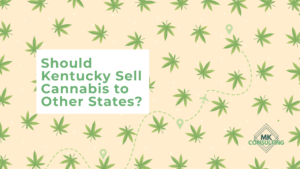The future of cannabis is bright and getting brighter every day.
Despite the fact that cannabis is illegal under federal law, it is one of the fastest-growing sectors in the United States. According to the latest Gallup poll, 68% of Americans feel marijuana should be legalized, and 18% of Americans admit to smoking it, up from 10% in 2005.
The industry has had improvements in recent years, and 2021 was no exception.
There were some important legislative advances made that are promising for the future of the industry. Even if Congress did not adopt a measure to legalize marijuana on a federal level, there have been some positive developments. The Safe Banking Act, which would provide the industry easier access to the banking system and repeal the industry’s harsh tax regime, cleared the House for the fifth time, but failed to pass the Senate.
Additionally, new states were added to the legalization map in 2021, bringing the total number of states where marijuana is legal to 36 (medical) and 19 (recreational). Read on to find out more about the most recent states to decriminalize cannabis.
Recreational
New York
After years of unsuccessful attempts and stalling initiatives, New York has legalized recreational marijuana.
In September, state lawmakers backed a bill that legalizes marijuana for individuals 21 and over, paving the way for the formation of a $4.2 billion industry that could become one of the country’s largest. Gov. Andrew M. Cuomo then signed the bill into law.
New Yorkers can now possess up to three ounces of recreational cannabis or 24 grams of concentrated cannabis, such as oils derived from a cannabis plant, for personal use.
People aged 21 and up are permitted to use, smoke, eat, or consume cannabis products, as well as to give them to others of the same age.
People will be allowed to keep up to five pounds of cannabis at home, but they must take “reasonable steps” to ensure it is kept in a secure location.
Possessing more than the allowed amount of cannabis or selling it without a license carries penalties ranging from a minor infraction to a crime.
New Jersey
In the Garden State, recreational marijuana is now legal.
After a failed attempt in the state legislature to pass recreational marijuana, a statewide ballot question that was overwhelmingly approved by voters, and subsequent disagreements over how the new system should be implemented, Gov. Phil Murphy signed three new laws in February effectively legalizing marijuana for personal use.
For those aged 21 and over, possessing six ounces or less of marijuana — and using it on private property — is officially legal in New Jersey. That implies you won’t face any criminal charges.
However, buying or selling recreational marijuana is still technically illegal, and will be until state officials create regulations and issue licenses to the businesses that will make up the new legal market.
According to Dianna Houenou, the incoming chair of the New Jersey Cannabis Regulatory Commission, residents won’t be able to stroll into a recreational marijuana dispensary and buy cannabis until 2022.
Connecticut
The Connecticut Legislature enacted a measure on June 17, 2021, allowing the state to legalize cannabis use for anyone aged 21 and over, and Governor Ned Lamont signed it into law on June 22, 2021. Adult use of cannabis will be legal in Connecticut as of July 1, 2021.
The new legislation builds on Governor Dannel P. Malloy’s previous administration’s legalization of medical marijuana in June 2012.
Senate Bill 1201 allows adults over the age of 21 to possess up to 1.54 ounces of cannabis on their person and up to 5 ounces of cannabis in their homes or locked in their car, truck, or glove box. Beginning July 1, 2023, all adults aged 21 and above will be allowed to grow six cannabis plants indoors in their homes.
The bill also changes the penalty for adult possession of up to 1.5 ounces of marijuana from a criminal misdemeanor (previously punishable by one year in jail and a $1,000 fine) to a non-criminal infraction (previously punishable by a $150 fine, but no arrest or jail time and no criminal record).
New Mexico
In June, New Mexico’s marijuana legalization law went into effect, making limited personal possession and cultivation lawful for people 21 and older.
For personal use, people can now possess up to two ounces of cannabis, 16 grams of concentrates, and produce up to six mature plants. However, it will be some months before retail sales begin.
In New Mexico, authorities must form an advisory committee and begin accepting certain marijuana company licenses by September 1st, according to a timeline issued by the Cannabis Control Division, which is part of the state Department of Regulation and Licensing.
The division must provide licenses to qualifying commercial cannabis enterprises by January 1, 2022, and begin licensing marijuana training and education programs by January 1, 2023. By April 1, 2022, retail marijuana sales must be up and running.
There is no cap on the number of company licensees or the number of facilities a licensee can open under the program, though authorities may halt awarding new licenses if an advisory committee concludes that “market equilibrium is insufficient.”
In order to ensure that medical patients have access to medicine when the adult-use market opens, the bill permits the state to require licensed cannabis producers to set aside up to 10% of their product for patients in the event of a shortage or to cultivate more plants for medical products.
Virginia
On April 7, 2021, the Virginia General Assembly agreed to make it legal for people to possess up to an ounce of marijuana on July 1, roughly three years earlier than the lawmakers had approved in February.
Republicans in the House and Senate sought legislative techniques to prevent passage of the marijuana measure, arguing that a faster legalization date would encourage the illicit marijuana trade while the state built its infrastructure for legal sales.
In January 2022, the Virginia Senate approved a measure to expedite the schedule for retail marijuana sales, allowing current medical dispensaries to begin selling to the general public in September. In what senators described as a move to offer Virginia farmers a share of what is projected to be a lucrative recreational market, the bill also allows a few large industrial hemp processors to sell their products early.
The proposed schedule gives businesses a 16-month head start over the 2024 start date that is still being considered for the broader sector. However, after passing the Senate on a bipartisan 23-16 vote, the bill’s final passage remained uncertain near the halfway point of the Virginia legislative term.
Medical
Alabama
With the passage of SB 46 this year, Alabama became the first state to legalize marijuana for medical purposes. The new Alabama law also states that the medical marijuana statute has no bearing on an employer’s right to deny or develop legal defenses to the payment of workers’ compensation benefits to an employee based on a positive drug test or refusal to submit to or comply with a drug test.
Other states that addressed medical marijuana this year:
- Kansas
- Nebraska
- Texas
- Mississippi
These advancements in cannabis legalization are exciting and very promising for the cannabis industry. The potential for cannabis retail and hemp growers is explosive. What will 2022 bring in terms of the marijuana landscape in the United States?
If you’re in the cannabis industry and looking for a marketing agency to partner with, MKC Agency wants in! We understand the intricacies of the industry and love being able to help grow your brand. Contact us today to find out more about what we have to offer!








